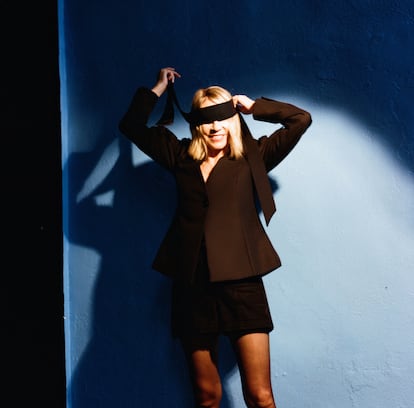Kim Gordon, science fiction nihilism
The second solo album by the co-founder of Sonic Youth, ‘The Collective,’ is a dark and distorted experiment that attempts to understand the thinking of the present day

There is a book without which the new album by Kim Gordon would not be the same. The queen of no wave and legendary co-founder with her ex-husband, Thurston Moore, of the flagship of noise, Sonic Youth, has released her second solo record, The Collective. “The title is something I got out of that novel,” Gordon says of Jennifer Egan’s latest publication, The Candy House. One of the album’s powerful and dark — as well as very deep and distorting — songs has the same title. “I don’t know, I think the album has a sci-fi vibe because of that novel. It’s not the only book that’s inspired things for me this time, though. There’s another one, and it’s one I’ve wanted to read for a long time, and I finally read it: The Lover, by Marguerite Duras,” she adds.
It is an ordinary February morning in Los Angeles. Gordon is at home, relaxed, and extremely open to talking about all sorts of things. “I love the new season of True Detective. Jodie Foster is mind-blowing,” she says. “I’ve seen a lot of good movies this year. I loved Poor Things, but also Anatomy of a Fall, and The Zone of Interest, and Fallen Leaves — it’s very curious because it’s a romantic comedy, but it’s a Finnish romantic comedy, with that cursed charm, that sadness…” The chat takes place via video call. On the wall behind Gordon is a huge poster for Jean-Luc Godard’s 1966 film Made in U.S.A and a handful of small paintings, scattered here and there, the sun shining. Why had she wanted to read The Lover for so long? “Because of the time Duras spent in Vietnam as a child,” she answers.
“I spent a year in Hong Kong when I was a kid. And Duras was born in Saigon [modern-day Ho Chi Minh City]. She grew up there and I had always been curious about what she recounted in The Lover. It’s a great novel. The movie is also very good. I guess it somehow inspired part of the album, and in a very direct way a song, Tree House,” she says. The track in question is an ethereal and electrifying evocation, a blurred weight, a distorted howl of metallic guitars that never quite meet. And an indispensable piece of an album that, as the English artist Josephine Pryde — a good friend of Gordon’s — says, sounds, at times, “radioactive,” especially in Shelf Warmer, pure disturbing dub calm, and that seems to place some order to the invaded thought of the present.
An order that is pure interference, or lists of things to do, or of, simply, things. As is the case on Bye Bye, the album’s opening track. The song’s video stars Gordon’s daughter, Coco Gordon Moore. And what we see in it is an escape. The girl running away from home, and then going to places like gas stations to get the things her mother is talking about — toothpaste, a toothbrush — making the video itself a kind of short film, or art installation. “Well, the filmmaker [Clara Balzary] is a friend, and she had told me about an idea for a short film she wanted to do with my daughter, and suddenly it was perfect for the song, so we did it. She told me the thing was to think about someone who’s running away from a cult, or running away from home. Since we’re in Los Angeles, I told her, she’s escaping from both. From home, and from the cult of life in the suburbs,” she says, laughing.

Justin Raisen, who has worked with Lil Yachty, John Cale, and Yeah Yeah Yeahs, among others, is again behind the controls. Raisen produced No Home Record, Gordon’s first solo album, in 2019, and on The Collective he sounds even more solid, and in some sense, freer. The record is peppered with damaged dub and trap constructions in which Gordon’s intuitive word collages shine, in their very dark, opaque, way. “I guess I’ve come out with a bit of a nihilistic record,” she says. She also concurs that the songwriting has been, to some extent, free. “I don’t go around weighed down with notebooks composing or anything like that. Sometimes the words just come out of my mouth. Other times, I make lists, and I fit them into whatever Justin suggests to me. The interesting thing on this album is the role of the guitars. We gave them total freedom. I wanted the album to have that spirit. Something that captures the moment,” she says.
This despite the fact that the record possesses, as does Egan’s novel, a touch of the present from a future “so close that it’s almost here.” A fictional future in which we are not only being dominated by algorithms, but are deciding to move away from ourselves to the point of living the lives of others. “That’s what the book is about. There’s an app that allows you to enter other people’s minds and have access to their memories. What it asks in return is that you upload all your memories so that others can use them,” she explains. “The title, The Collective, is also something that the novel inspired. Music is a collective to be a part of.” Something that today is becoming somewhat domesticated. “If you’re lazy you’re only going to listen to certain things. It’s hard to explain the punk concept to today’s kids. It’s not about how you dress, it’s about not worrying about being part of the status quo,” she says. In that sense, she values the role of Billie Eilish, who is offering “something different” to younger people.
Kim Gordon could be a sort of explorer in the abyss, a sonic abyss that seeks precisely that: to break with any kind of preconceived idea, to destroy the norm. “Yes, sometimes, I tell myself that we are doing an intervention on the world,” she says. Before hanging up, she touches on feminism. I’m A Man, one of the tracks on the album, is “about all those men who think feminism has ruined their lives.” “I joke about Nancy Reagan and the time when men went about being protectors and saviors; they thought they were cowboys!” she says, laughing. “I love it, because it wasn’t feminism that ruined anything for them, it was capitalism, and they don’t realize it. It’s comical. If they’ve lost their role it’s because they’ve become consumers, and that’s how capitalism needs them: dissatisfied, lost.”
Sign up for our weekly newsletter to get more English-language news coverage from EL PAÍS USA Edition
Tu suscripción se está usando en otro dispositivo
¿Quieres añadir otro usuario a tu suscripción?
Si continúas leyendo en este dispositivo, no se podrá leer en el otro.
FlechaTu suscripción se está usando en otro dispositivo y solo puedes acceder a EL PAÍS desde un dispositivo a la vez.
Si quieres compartir tu cuenta, cambia tu suscripción a la modalidad Premium, así podrás añadir otro usuario. Cada uno accederá con su propia cuenta de email, lo que os permitirá personalizar vuestra experiencia en EL PAÍS.
¿Tienes una suscripción de empresa? Accede aquí para contratar más cuentas.
En el caso de no saber quién está usando tu cuenta, te recomendamos cambiar tu contraseña aquí.
Si decides continuar compartiendo tu cuenta, este mensaje se mostrará en tu dispositivo y en el de la otra persona que está usando tu cuenta de forma indefinida, afectando a tu experiencia de lectura. Puedes consultar aquí los términos y condiciones de la suscripción digital.









































